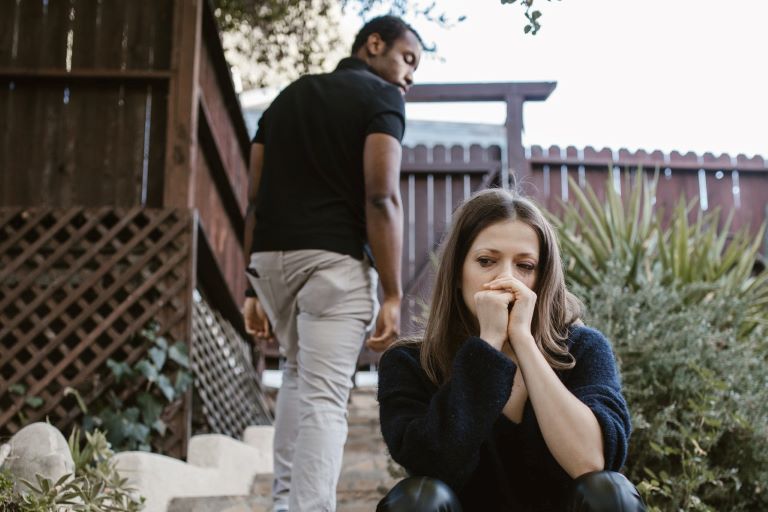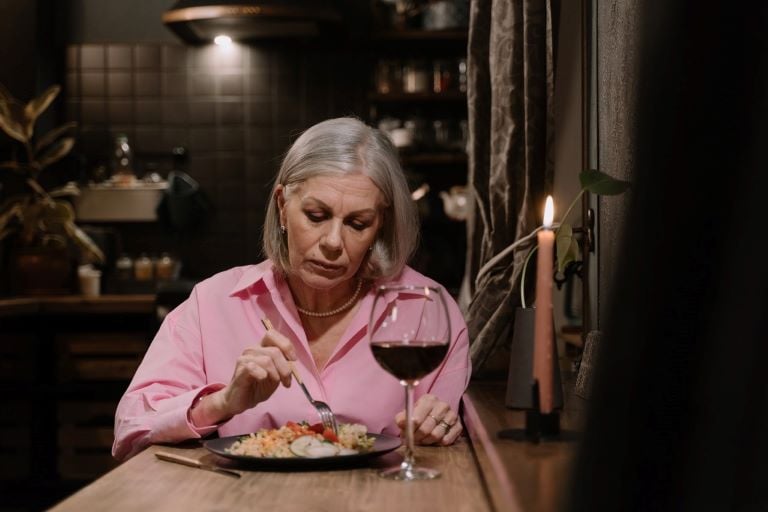How to Get Out of A Toxic Relationship and Reclaim Your Power

Ready to Attract the Love You Deserve?
No one consciously chooses to enter into a toxic relationship, but unfortunately, it’s all too easy to slip into one without even realizing it. Weeks, months, or even years can pass by with you hoping to resolve your issues and build a happy life together, but this doesn’t happen. The cracks in the relationship usually swell until one day it hits you like a ton of bricks. You realize you’re in a toxic relationship, and now you’re wondering how to get out.
The truth is, all relationships are hard work. There will not be sunshine and rainbows and unicorns flying in the sky every day. You will both have your strengths and flaws. You’ll have disagreements and obstacles to navigate through. Sometimes things will be said or done that will hurt and will need to be forgiven. However, in a healthy relationship, life will be good most of the time—like, 90% of the time. Your relationship will feel nurturing, supportive and loving.
What is a toxic relationship?
In her book Toxic People, psychologist, and author, Dr. Lillian Glass defines a toxic relationship as “any relationship [between people who] don’t support each other, where there’s conflict and one seeks to undermine the other, where there’s competition, where there is disrespect and a lack of cohesiveness.”
Similarly, Dr. Kelly Campbell—an associate professor of psychology and human development—says: “A toxic relationship is one that adversely impacts a person’s health and well-being … Because we spend so much of our time and energy on a romantic partner, these relationships are especially influential on our well-being. When they are going well, we are usually doing well. But when they are not going well, our health and happiness will likely be negatively affected.”
Toxic people love to control everything and everyone around them, keeping others small, meek, and manageable. Everything they say and do is an attempt to keep you in your place. It’s common for qualities like kindness, compassion, and respect to be missing altogether in a toxic relationship. While it’s more common for one partner to be toxic, it’s also possible for both people in a relationship to be equally toxic.
You might think that only vulnerable people are susceptible to falling into toxic relationships, but this isn’t always the case. You could be a powerful, independent woman to begin with, but each day you spend with this toxic person slowly eats away at your confidence, self-worth, and strength. Without realizing it, you become a shadow of the person you used to be. And every day, it becomes a little harder to leave.
Signs of a toxic relationship
Am I in a toxic relationship?
It can be challenging to know whether you’re in a toxic relationship or not when you’re in it. Emotions can cloud your judgment, and manipulative tactics like gaslighting can convince you that it’s all just in your head.
Toxic relationship signs include:
- Loss of boundaries
- Unprovoked jealousy
- Controlling behavior
- Emotional manipulation
- Disrespectful behavior
- Criticism and put-downs
- Lack of support
- Dishonesty
- Unwillingness to communicate
- Constant fighting
- Walking on eggshells
- Investing a lot but getting little in return
- Feeling held back
- Lack of independence
- Depleted self-worth and self-confidence
- Resentment
- Negative financial behaviors
- Constant stress
- Lost relationships (friends and family etc.)
- Lack of self-care
The most unmistakable sign you’re in a toxic relationship is when feeling bad becomes the norm. This is your intuition howling at you to end things now and get yourself out. A relationship should make your life better. If it’s not doing that, then it’s time to walk away.
A note on abuse and domestic violence

There’s a blurry line between a toxic relationship and an abusive relationship. Many of the behaviors that are considered to be toxic can also be deemed abusive, whether it’s verbally, emotionally, physically, financially, or sexually. A relationship doesn’t need to involve abuse to be considered toxic, whereas ALL abusive relationships are inherently toxic.
Did you know that over 1 in 3 women will be in an abusive relationship at some point in their lives? Females between the ages of 16 and 24 are roughly three times more likely to be abused by an intimate partner. And in another study, 40% of women reported experiencing expressive aggression from a partner, while 41% reported coercive control (abuse that aims to harm, punish, or frighten the victim).
If you ever experience abuse in a relationship, I want you to know that:
- You don’t deserve it (nobody does)
- It’s not your fault
- You need to get yourself away from this person as quickly and safely as possible.
Can a toxic relationship be saved?
Maybe you’re here because you want to know how to fix a toxic relationship. While it’s true that toxic people can change, it’s doubtful that they will. And if they are going to change, it has to be driven by something inside them. This means nothing you or anybody else says or does will change them. Your mind might convince you this time, things will be different. He seems like he means it and has showered you with sorrys, I-love-yous, and a hundred red roses. But look at his past experiences and present actions—this is where you’ll find the truth.
Why is ending a toxic relationship so hard?
Real love never holds someone back from stepping into their full potential. In a healthy relationship, there is room for flexibility, change, and growth. But in a toxic relationship, everything feels rigid, defined, and boxed in. This is why when you try to break out of this mold, the boat gets rocked. The ground feels shaky for both of you, and the toxic partner will do anything they can to restore the dynamic back to the way it was—back to a controllable situation.
The more you try to break away from a toxic relationship, the more you’ll feel this pull. And although it might feel like the act of breaking away is what’s hurting you; eventually, you start to realize that it’s the relationship that’s causing the pain.
When someone loves you, it feels like love. If it doesn’t feel nourishing, supportive, and kind, then it’s not love. And if it hurts, then it’s hurtful. Only you will know the truth.
Here’s how to get out of a toxic relationship

Here’s everything you need to know about how to get yourself out of a toxic relationship and how to get someone else out of a toxic relationship for good.
1. Record your feelings
Many women take a long time to realize they’re in a toxic relationship because they focus on and cling to the occasional happy moments while overlooking the bad ones. So, if you think you or someone else might be in a toxic relationship, start by keeping a record of your interactions and feelings. Write down any conflicts, communication blocks, hurtful words or actions, and how they make you feel in the moment. Over time you’ll be able to recognize whether there are any patterns to the behavior, as well as how often these interactions occur.
If you notice a recurring pattern, this is a clear sign the relationship is toxic.
2. Accept that the relationship is toxic
Once you become aware that you’re in a toxic relationship, the next step is acceptance. It’s all too tempting to focus on the good times you’ve shared and try and convince yourself that things aren’t that bad. But this is simply a tactic we use to avoid doing the thing we dread most: ending the relationship.
“Leaving any relationship, toxic or not, creates a grief response similar to a bereavement. The individual has to go through the stages of accepting that the relationship was toxic and that leaving was the best option. Once that happens, the individual has to go through emotions such as hurt, anger, loss, and sadness,” says Dr. Bijal Chheda-Varma (psychologist at London’s Nightingale Hospital).
If you want to cope with the loss, heal, and ultimately move on, you must start with acceptance. Give yourself permission to grieve. Acknowledge everything that was wrong with the relationship.
3. Stop waiting for your partner to change
As I mentioned earlier, waiting, hoping, and praying that your toxic partner will have an epiphany and suddenly morph into the man you want him to be is blind optimism. You cannot control anyone else in this world. The only person you can manage and change is YOU. And as you probably know, it’s damn hard to make significant changes in your life that stick. Think about a time when you’ve tried to change a habit or pattern, or behavior. It’s far from easy, right?
Words are cheap, and he might be promising you this time things will be different. But how many times has he made and broken promises like this? Pay close attention to his actions—these will tell you everything you need to know.
4. Ask for help
If you feel lost, alone, or trapped in a toxic relationship, I’d recommend seeking help today. Talk to family and friends you trust, find a good therapist or relationship coach, or reach out to one of the many women’s charities and support groups out there. Make sure someone knows what’s going on. Talking to someone outside of the relationship will give you a fresh perspective, reassurance that it’s not all in your head, and help restore your sense of self-worth.
Editor’s note: Ready to attract love with a proven strategy? Watch this free video to learn the 7 powerful steps
Remember—try not to feel embarrassed about what’s happening or ashamed for seeking help. You haven’t done anything wrong. There are people out there who will listen and want to help you leave this toxic situation and heal.
5. Plan your exit
Put your safety first
Depending on the dynamic of your relationship, you may have concerns about ending things out of fear of your safety—and you’re not wrong to feel this way. The 2020 Femicide Census reported that 41% of women in the UK killed by a male partner (or former partner) had separated from them or taken steps to separate from them. I’m not sharing that stat to scare you; I’m sharing it so that you’re aware of the potential dangers and are focused on making your safety a priority.
Think about whether you’re at risk. If there’s the tiniest chance you are, remove yourself from the relationship immediately, find a safe place (with friends, family, or a shelter), and don’t tell your partner where you’re going.

Have a strategy
The best way to get out of a toxic relationship is to have an exit strategy when you finally call it quits. Think about where you’ll stay, what you’ll bring with you, and how you’ll support yourself on your own. Don’t leave it to the last minute and hope for the best.
Start saving money
One of the most significant factors that keep women in toxic and abusive relationships is that they financially depend on their partners. This is often the case when women have kids, give up their job to raise them, and have no savings of their own to fall back on in an emergency.
If this rings true, start saving money today. If you don’t have one already, open a separate bank account and ensure your partner does not have access to it. Save whatever you can as often as possible.
How to get out of a toxic relationship with no money: lean on someone in your community (a family member, friend, or neighbor) to help you in the immediate transition period. Someone may be able to lend you some money to keep you going while you find your feet again. There are also shelters you can go to if you need a place to stay while you find a place of your own.
Find your way to financial independence
If you don’t have a career or education to fall back on that you know will financially support you, start paving a new path for yourself today. You might look into going back to school or applying for an entry-level job. Every woman needs to have enough money to walk away from a relationship at any moment. Financial independence equals freedom.
6. Talk to your partner
Once you’ve got a plan in place, the next step to get out of a toxic relationship is to talk to your partner. Communicate clearly and confidently that you are leaving and the relationship is over. Avoid blaming or judging—stay focused on how you feel and what you need and want. Have a rough script to follow if this helps.
Be prepared for him to plead with you to stay at all costs. But stay strong and finish what you came to do. This will likely be the biggest challenge of leaving the relationship, but remember, once it’s done, it’s done, and the only way from here is up.
And as I mentioned above, if you don’t feel safe being alone with your partner, have someone with you when you have this conversation. If this still makes you feel in danger, there’s always the option of sending a text or email instead. There aren’t many instances when breaking up via email would get my approval, but this qualifies as one of them!
7. Don’t wait for an apology or closure
At the end of any relationship, many of us look for closure. If there’s been any wrongdoing, we want nothing more than for our partner to own up to their mistakes and apologize. The problem is that an apology usually never comes. And this leaves us feeling like we can’t move on.
Remember what I said earlier—the only person you can control is yourself. Remind yourself that you didn’t deserve to be treated the way you were or to be in a toxic relationship. The best thing you can do for yourself and your future happiness is to move on.
“Someone might realize they are finally ready to move on from a relationship like this when they have done some work on themselves and have a better sense of self-esteem. They know what they want and what they deserve … When they start to think of things in these terms, they know it is likely time to start to move on,” says Nicole Martinez, Psy.D., LCPC.
8. End communication
It’s common for toxic people to play the victim and do anything in their power to blame you and get everyone to see things this way. Don’t take the bait. Cut off all communication, block them on social media, and change your phone number if you need to. Don’t try to remain friends. Don’t flirt. And definitely don’t have breakup sex—this will only keep you caught in the toxic web.
Of course, ending communication becomes challenging if there are children involved. If this is the case, keep contact to the absolute minimum. And if you feel like your kids aren’t safe around your ex-partner, you may want to pursue legal action.
9. Remember it won’t always be easy

Breaking up with anyone—even when you know it’s best for you—can be rough. The loss you’ll feel is real, even if your ex didn’t always treat you well. Adjusting to being single and on your own again will take time. You may have lost a sense of who you are and need to rediscover your personality and let it shine. This can feel overwhelming, so be kind and patient with yourself during this transition. Do little things that make you happy each day. Strive for small achievements. Reconnect with friends and family that you lost touch with. Take care of your body and mind.
How to move on from a toxic relationship
Look for the lessons
Avoid the trap of becoming an eternal victim of the toxic relationship you found yourself in. Focus instead on what you learned about yourself and about relationships. Remove the emotion from it and look for the golden nuggets of wisdom.
What do you need to leave behind here? What are the good things you’ll carry with you into future relationships? How have you grown in the process?
Be patient with yourself
Give yourself as much time and space as you need to process all your feelings and rebuild. There is no timeline for when you should be okay.
Rebuild your self
When you leave a toxic relationship, you’ll have to detox from all the thoughts and beliefs created in it. This is your time to rediscover who you are without someone else. Show yourself compassion. Dive into getting to know yourself on a deeper level than ever before. There are no limits or boundaries on the woman you can be. This is how to heal a toxic relationship.
Surround yourself with people and things you love
It might not feel like it will make any difference, but surrounding yourself with things and people that make you happy can boost your outlook. So spend time with people you love, people who lift you up. Focus on what’s good in your life and your strengths. Explore new hobbies and reconnect with old ones.
Make time for self-care

Self-care will be a healing balm for you now, so create space for it every day. Cook yourself a nourishing meal, enjoy ten minutes of meditation, take a yoga class, soak in a bubble bath, get a makeover, have a DIY home-spa session, get a massage, or go on a vacation somewhere.
Indulge in plenty of self-care and remind yourself you’re worthy of it.
Know that you deserve real love (and that was not it)
The final step of leaving a toxic relationship is to teach yourself that you are worthy of a kind, caring, supportive, nurturing partner who loves you. Once you embody this belief, you’ll attract people into your life who match it. You’ll no longer be drawn to toxic or emotionally unavailable men thinking you can “fix” them. You’ll immediately recognize their wounds, notice the red flags, and attract a healthy, functional, loving relationship.
And that’s how to get out of a toxic relationship
I understand it’s hard to leave something that feels comfortable and familiar, which is why leaving a toxic relationship (or any relationship) can be tricky. But it will always be worth it in the end. You are not here to be someone else’s punching bag or to make someone else feel bigger by shrinking yourself down. Be strong. Be brave. And be all that you came here to be.
Have you ever been in a toxic relationship? What made you realize it was toxic, and how did you find the courage to walk away? Let me know in the comments below.
Sharing your story could help a woman you’ve never met find her strength.





When I was 19. I’m 36 now I was in live in situationship with a guy who I lost my virginity to. After I had sex with him for the first time he got very possessive and thats when the abuse started. He didn’t hit me but he did torture me. Like tried to drown me on the kitchen floor by pouring water over my face. Tieing me to a chair to watch while he threw away all of my possessions he didn’t think I needed. Etc. I tried to leave him countless times but every time I told him… Read more »
I would change my number if I were you. He sounds crazy.
Spot on everything you stated!
Bravo! Right on! Excellent -Outstanding write up on this topic!!! Thank you for providing this extremely important and helpful info the way you have to everyone! You are the Best! I never write comments to anything online, but I just had to offer feedback on this! Truly impressive and spot on! Read this carefully, Everyone! And Follow it!
Thank you!
My middle child told a therapist that he was scared of his dad and didn’t want to live w him anymore. That got the ball rolling… I was too chicken to leave sooner, though I’d known 8 years earlier that I should leave. The toxic relationship I was in made my 3 year old, my youngest child to become violent. Her father, the toxic Narcissist kept telling me I was the reason she was out of control, because I wasn’t strict enough. It’s 5 years since the divorce was final and 6 years since we’ve been apart. It put a… Read more »
“Yes, I was trapped in a toxic relationship for an astonishing 27 years. During this seemingly endless period, I endured constant belittlement, the invalidation of my feelings, and relentless manipulation. Stonewalling became a routine occurrence, ensuring that we never engaged in any meaningful discussions. Despite my persistent unhappiness, my faith in God kept me tethered. I believed that leaving would be a betrayal to my faith, portraying God as unable to save my marriage. I held positions of responsibility within my church community and dreaded the judgment of fellow church members. The title ‘Mrs.’ held immense significance to me, and… Read more »
Navigating the end of a toxic relationship is incredibly difficult, especially when emotional health has been worn down. For anyone on the path to recovery, exploring wellness resources like Mindbodygreen reviews can be a great next step. Their insights into emotional healing, self-care, and personal growth can really complement the advice shared here and help rebuild confidence after leaving a harmful dynamic.